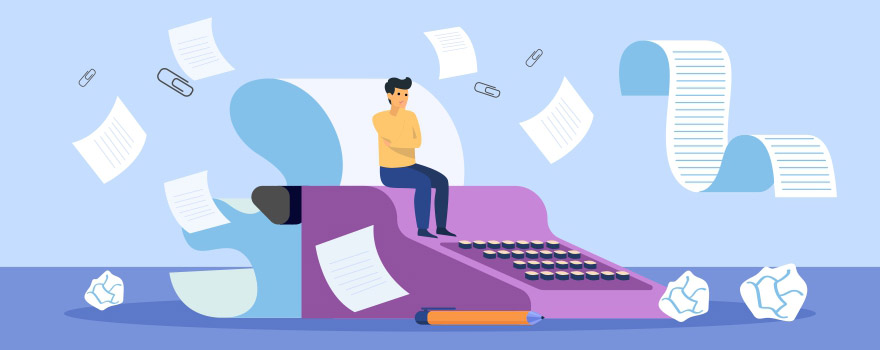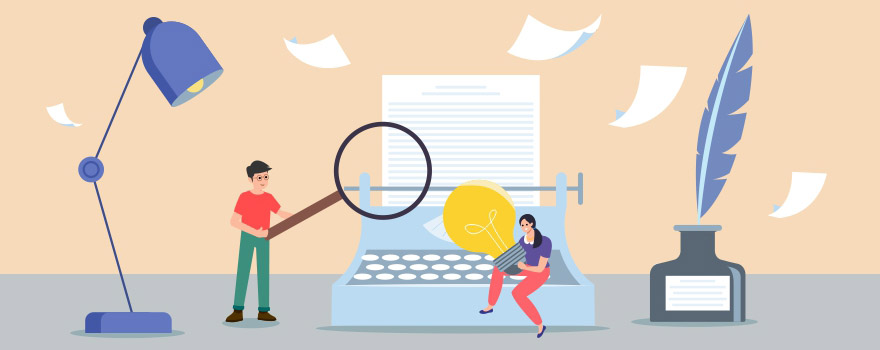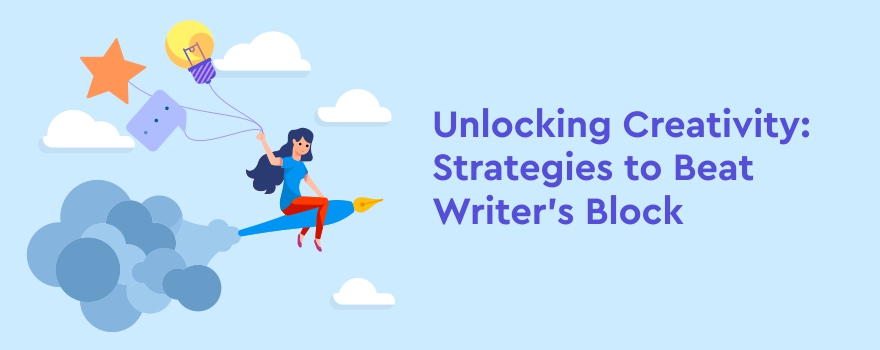Millions of people write every day. While you may think that writing only involves novels and scripts, it is important to recognize how important writing is across a range of fields.
Journalists, students, advertisers, educators, and researchers are just a few of those who write on a regular basis. Therefore, it is no surprise that many people around the world suffer from one of the most frustrating experiences ever: writer’s block.
This mental barrier can leave the most seasoned of writers staring at a blinking cursor and wondering where they went wrong.
Writer’s block can happen to anyone, and it is caused by a variety of factors.
Is Writer’s Block Real?

In the writing community, there is disagreement as to whether writer’s block is real or an excuse to not complete a task. Roger Simon, a renowned journalist, famously said, “There is no such thing as writer’s block. My father drove a truck for 40 years and never once did he wake up in the morning and say: ‘I have truck driver’s block today. I am not going to work.’”
This sentiment is shared by many others in the field, including Dr. Paul Silva, who believes that writer’s block is a term people use to make their frustrations seem more serious and complex.
Despite the naysayers, research shows that writers may genuinely have trouble creating content. While writer’s block isn’t an illness you can catch that instantly stops your ability to create, it is possible to suffer from factors that can block your creativity.
This guide will delve into this concept of writer’s block and provide powerful resources for those who are having trouble writing.
Get in The Right State of Mind
An important step in the creative process is to prepare yourself by entering what psychologists call “flow state.”
The term “flow” was penned by Mihaly Csikszentmihalyi, a pioneer in positive psychology. The concept of being in “flow state” was studied long before Mihaly, but his research into the phenomenon led to a deeper understanding of the topic and how it can benefit writers.
According to Mihaly, being in flow state means you have prepared yourself and become so in tune with the work at hand that you complete the task seamlessly with little stress and few interruptions. This type of workflow helps writers avoid the pitfalls that lead to writer’s block.
Have you ever been so focused on a task that you look up and realize that 3 hours have passed? This is likely because you were in a state of flow. Some people refer to this as being “in the zone.”
Entering flow state is different for everyone, so take the time to assess your writing process and determine the things you need to ensure the ultimate level of focus and comfort.
For more details on entering flow state, check out this guide from Asana!
10 Quick Tips for Overcoming Writer’s Block

Unlocking creativity may look different for everyone. To begin, check out these 10 quick tips to overcoming writer’s block from professional writers around the world.
- Take a Hike – Use the time alone in nature to let your brain naturally come up with ideas.
- Write Anything – Stop working on the piece at hand and start writing something completely different. The goal is to give your brain a break from the project that is causing issues while staying in the writing mindset.
- Push Through it – Refuse to believe you have writer’s block and just keep writing, even if you must complete major revisions later.
- ake a Nap – Many writers sleep to reset minor writer’s block. If you wake up with a good idea, remember to jot it down.
- Read Something – Allow yourself to be inspired by the work of an author you greatly admire.
- Focus on Character Creation – if you’re writing a piece of fiction, take a break from writing the story and focus on mapping out your characters. You may find their motivations and goals help push the story forward.
- Turn Music On or Off– If you usually write while listening to music, try turning it off. Some people struggle with processing thoughts while actively listening to something. On the other hand, if you usually work in silence, try listening to music to help get your creativity flowing.
- Draw Your Thoughts – If you are struggling to get your ideas into words, try taking a break to draw or paint the idea instead.
- Meditate – A popular piece of advice among writers is to practice calming activities like yoga and meditation to reset the brain.
- Juggle Multiple Projects – Many writers believe that simultaneously working on various projects helps prevent writer’s block. Any time they are at a loss for words, they can simply switch to a different project.
Writing, whether a song, flash fiction, or a deeply researched essay, is an incredibly personal experience. That is one of the main reasons there are so many conflicting suggestions when it comes to overcoming writer’s block. These popular tips may work for you, but don’t be discouraged if they don’t. Instead, consider looking at a more scientific approach to boosting your creativity.
A Scholarly Approach to Overcoming Writer’s Block

Writer’s block, or a general halt in creative thinking, is an issue most people will face in their careers. It is such a prolific issue that multiple scholars have worked on evaluating its causes and remedies. However, the research isn’t particularly easy.
First of all, it is nearly impossible for researchers to agree on the specific parameters that constitute true writer's block.
According to studies conducted in 1984, 1985, 1993, and 2015, the definition of writer’s block is “the inability for a writer to produce new material.” However, these same researchers excluded specific “types” of blocks as not being part of the definition. According to these researchers, procrastination and evaluation apprehension are separate issues and cannot be lumped into writer’s block.
Sarah Ahmed, a graduate student at University of North Florida, researched the psychology of writer’s block in her 2019 dissertation, “An Analysis of Writer’s Block: Causes, Characteristics, and Solutions.”
In her study, she acknowledged these differences in definition among previous scholars but chose to research the issue with a broad lens. For her, the issues that other researchers called “separate issues” were symptoms of a larger problem.
This research into writer’s block is one that could lead to helpful solutions, similar to the research completed in 1984 by German painter and writer Mike Rose.
In Rose’s book, “Writer’s Block: The Cognitive Dimension”, the author acknowledges that writer’s block must be broken down into subscales of issues to determine the root of an individual’s struggles.
Some of these subscales involve the inability to get words on paper (traditional writer’s block), the inability to complete the task by a deadline (procrastination), and the obsession with correcting work as you go (premature editing).
By diving into Ahmed’s research and Rose’s book, we have found 10 of the most common issues that lead to writer’s block, along with their suggested solutions.
1. Lack of Preparation
One of the most crucial steps in the writing process is prewriting. In this step, writers fully prepare for the task at hand. They make sure they understand their assignment, finalize the topic, work on writing strategies, brainstorm ideas, and create an outline. Despite its importance, many writers skip prewriting, which can lead to writer’s block later in the creative process.
If you find yourself wasting time jumping back and forth between research and writing, struggling to maintain consistency in your writing, or forgetting which details you have included in your work, you may have skipped important steps in the prewriting process.
Solution: Return to the beginning and complete step 1 and 2 of the traditional writing process (Prewriting, Drafting). Even if you are deep into your project, you may find that this will help you organize and complete your piece more efficiently! For more details on the writing process, check out the KU Center for Learning and Writing Support.
2. Inability to Articulate Thoughts
A common issue among those struggling with writer’s block is the inability to get the thoughts from their mind onto the paper (or screen). Even those who strictly complete the prewriting phase and create an outline can suffer from this issue.
For some, this problem can cause other subsets of writer’s block, like writing anxiety and lack of joy. However, this problem is not indicative of being a bad writer. Instead, it is often a by-product of the way the human brain works.
Solution: The brain is great at storing large amounts of memories and details, but it relies on you thinking of the right words or images to cue up those thoughts. If you are struggling to get your thoughts into words, try these 3 techniques:
- Take a brain break to allow yourself time to come up with the words you need. You may find that those distant thoughts suddenly pop to the surface in the middle of a walk or a shower.
- Take notes of your thoughts throughout the day, and then reference these notes during your writing sessions. Thoughts may come to you at random times, so keep a notepad or phone nearby for easy access.
- Try writing your thoughts down with whatever words come to you, even if they are wrong. You may find that as you get words on the page, the right words will suddenly make their way to the surface.
3. Fear of Judgement (Evaluation Apprehension)
One of the most well-recognized causes of writer’s block is evaluation apprehension, which is the fear of what others may think of your work. If you’ve ever had thoughts like, “I am up against some of the best writers in the industry, I’ll never stack up,” or “Everything I write is so amateur,” you may be a victim of this type of writer’s block. Evaluation apprehension is similar to stage fright, because those experiencing it will feel extreme anxiety at the thought of others reading their work.
Solution: Evaluation apprehension can be debilitating. Often, those who suffer from this form of writer’s block may need cognitive behavioral therapy to overcome the issue. Others do well by practicing confidence-boosting techniques at home, including:
- Making a written list of your strengths
- Visualizing the positive outcome and feedback you wish to receive
- Picturing yourself delivering your work to a sympathetic crowd
- Surrounding yourself with a positive support system (friends, coworkers, colleagues, family)
- Recognizing the importance of criticism in the writing process and beginning to understand that negative feedback is a stepping stone to an improved product
4. Chronic Procrastination
Of the writers included in Rose’s and Ahmed’s research, nearly 13% reported struggling with procrastination. Procrastination is not considered a traditional subset of writer’s block, but it does indicate that other issues are present. The Writing Center at the University of North Carolina at Chapel Hill has a handy guide to help readers recognize the influences behind procrastination and how it relates to success as a writer.
Solution: Try breaking up the writing project into specific sections and tasks that take a short amount of time to complete. For instance, you might have a task that is simply “organize outline.” Completing small tasks and checking them off your to-do list can lead to a boost in dopamine, which helps give you the motivation to complete more tasks. For more information on how completing to-do lists can help productivity, check out this Workast article.
5. Medical Issue
During her research, Ahmed discovered that a common cause of writer’s block was the experience of a significant or unexpected medical issue. This could range from being diagnosed with cancer to dealing with recurrent hay fever.
Whether life-threatening or a mere nuisance, dealing with the frustrations of a medical issue can leave writers uninspired, tired, and incapable of sparking creativity.
Solution: Even if deadlines are looming, the most important thing you can do for yourself when ill is to be kind to yourself and flexible. Consider cutting your writing goals by half until you get used to living with your condition or until you improve. If there is no hard deadline, remember that it is important to take days off, just like any other job. If you give yourself time to heal or adjust to your illness, you may find that the inspiration to write will return.
6. Neurodivergent Writer’s Block
According to a 2020 study, nearly 20% of the world population are neurodiverse (ND). The neurodiversity spectrum is broad, but many of the associated conditions cause symptoms and behaviors that can make writing difficult.
If you are ND, don’t let your diagnosis discourage you. Some of the most prolific authors in the world are neurodivergent. A popular example is children’s author Dav Pilkey. Pilkey was diagnosed with ADHD and dyslexia as a child and was often punished in school for his behavior. It was during these punishments that he came up with the iconic character of Captain Underpants.
However, being neurodivergent presents a unique set of obstacles that can make defeating writer’s block difficult.
Solution: If you are having difficulties with symptoms of neurodivergence, consider talking to your general health practitioner or a mental health professional about medications and therapies that may help you. Alternatively, check out these free online resources for writing as a ND individual:
- What Does it Mean to Be Neurodivergent
- Writing When on The Autism Spectrum
- OCD and Writer’s Block
- When Your OCD Therapy is Also a Treatment for Writer’s Block
- Writer’s Block: 10 ADHD-Friendly Brain Tricks to Get Started
7. Lack of Joy or Inspiration
Perhaps the most commonly recognized cause of writer’s block is the inability to find inspiration or general motivation to get words on the page. It may be that you have no connection to the topic and can’t find joy in the research. Alternatively, you may enjoy the subject and want to research and write, but you cannot find the motivation.
Solution: Many studies have found that you can remedy this issue by removing the focus from the work and shifting it to your mental clarity. Those suffering from lack of motivation or joy found their writing largely improved by taking breaks to meditate, go for a walk, read a book, or perform another activity that allowed their brain time to relax and receive pleasant input. If you are new to meditation, you may enjoy these free meditation resources from the University of Connecticut SHARP Research Lab https://sharp.uconn.edu/meditation-resources/.
8. Writing Anxiety
Writing anxiety is a broad term that covers a variety of stressful feelings in the writing process. The anxiety may come from the possible consequences of the project (ex. needing a good grade, getting a promotion, etc.) or due to emotions triggered by the topic. If this type of anxiety is left unchecked, writer’s block is almost guaranteed.
Solution: Identify the cause of the anxiety and use the appropriate resources to overcome it. For instance, if you find that your anxiety is triggered by a tight deadline, consider reaching out to your professor, client, or boss to discuss ways to alleviate the pressure of the deadline. For more tips on dealing with writing anxiety, check out this resource provided by Vanderbilt University.
9. Lack of Flexibility
The first item in this list discussed preparing for writing and maintaining a high level of organization, but being too strict can also cause issues. An inability to be flexible with your writing can cause you to stumble into another cause of writer’s block: burnout.
Solution: If you’re stuck on a specific project, you should hop to a different section of the work or a different project altogether. Of the writers studied by Ahmed in 2019 and Rose in 1984, more than one third found that focusing their attention on a different writing activity helped spark the creativity needed to overcome their writer’s block.
10. Overworking (Burn Out)
Burnout is perhaps the most common cause of writer’s block, and it is something that can be experienced in any creative process. When writers spend too much time forcing themselves to be creative without reprieve, their brains can begin to associate the writing process with stress. The modern “hustle” mentality pushes many to take the grind too far to the point where they can no longer create.
The worst part about burning out is that it is difficult to reverse. Therefore, you should implement steps to avoid burnout. This means limiting working hours, practicing self-love, and not committing to more work than you can feasibly complete.
Solution: If you find that you are suffering from burnout, there are steps you can take to recover:
- Step away from writing and explore other creative outlets. This keeps your creative mind sharp while letting yourself heal.
- Create time for relaxation. This might be meditation and a spa day or a day out with your closest friends.
- Handle the boring tasks you’ve ignored while writing. Sweep the floors. Wash the dishes. Dust the ceiling fans. Allow yourself the ability to feel good about completing tasks without worrying about writing.
- Change your scenery. Try writing in a new place or switching the lighting and scent in your office space. This can trick your brain out of the stress response to writing.
- Check out this Jericho Writers guide to surviving burnout for more tips.
What to Do When All Else Fails
Writer’s block is frustrating. You may have tried every trick and tip with no success. In times like this, there is an important thing to remember: sometimes you just have to walk away.
If you find there is nothing that improves your ability to get words on the page, taking a break from the project might be the right solution. Take the time away to reassess some of the causes of writer’s block. With this distance, you may be able to recognize signs of burnout or performance anxiety that you couldn’t see before.
Some writers even benefit from speaking to a therapist or paying attention to their mental health during their writing break. Outside stressors can often have a major effect on our ability to be creative.
The following resources are great to learn more about the connection between mental health and creativity as well as ways to improve mental health without therapy.
- Lokyatha: How Stress is Eating into Your Creativity.
- FHE Health: Why Stress is the Enemy of Creativity
- Stress Management Society: Free Resources
- University of Michigan: Stress Management Tools and Resources
- Mayo Clinic: Stress Management
- Anxiety & Depression Association of America: Community Resources
- Anxiety Canada: Free Downloadable PDF Resources
- Everyday Health: Anxiety Resources
- Counseling Today: Treating Depression and Anxiety
- Counseling Today: A Light in The Darkness (Seasonal Depression)
Additional Sources [sources not directly linked in the article]
https://digitalcommons.unf.edu/cgi/viewcontent.cgi?article=1957&context=etd
https://eric.ed.gov/?id=ED248527
https://sharp.uconn.edu/meditation-resources/
https://dceg.cancer.gov/about/diversity-inclusion/inclusivity-minute/2022/neurodiversity
https://en.wikipedia.org/wiki/Dav_Pilkey
https://en.wikipedia.org/wiki/Writing_anxiety
https://lumivero.com/resources/dealing-with-writers-block/#:~:text=24%25%20nearly%20alw
ays%20had%20writer's,t%20finished%20their%20dissertations%20(Ph.
https://jerichowriters.com/writing-and-burnout/

